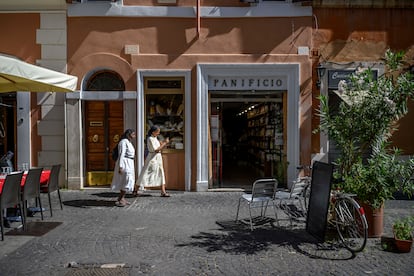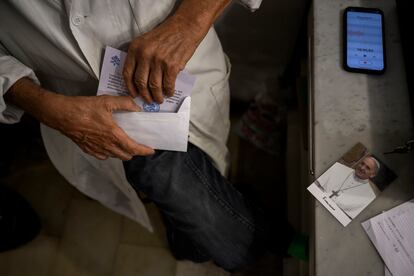Pope Francis loses his baker
Mass tourism and government indifference have led to the closure of Angelo Arrigoni’s historic shop, which has supplied bread for the Vatican over the last 90 years

The ritual never varied. At the crack of dawn, a trusted man handpicked by Pope Pius XI would arrive at the bakery clutching a locked case. Only two people had the key, and one was Angelo Arrigoni’s father, the baker who kept the key on his person at all times, even in bed. Arrigoni would unlock the case and carefully fill it with Viennese loaves, the favorite bread of Achille Ratti, who became the pontiff on February 6, 1922. The other key was kept in the papal apartment, where nuns stood ready to collect the freshly baked bread. This peculiar tradition stemmed from Pius XI’s fear of poisoning, as he was the first sovereign of Vatican City when it became an independent state. Over the years, the daily ritual faded with the succession of new popes. On July 8, after 90 years of making bread for eight popes, the bakery took its final bow and became yet another historic business crowded out by mass tourism.
The news sparked curiosity among the dwindling number of local residents, and several went to the bakery on Borgo Pio Street to see if it was true. The shop was open but it offered only a few products bought from another bakery so it could continue serving its customers before closing for good. “It’s all because of tourism...” murmured the baker. Pope Francis has been deprived of his daily bread since the end of June, and the Vatican, in a note to Arrigoni from the Secretary of State, expressed its sincere regret. Arrigoni sadly shows us the note. But Rome’s city officials have done nothing in response to various requests on behalf of the historic bakery.

Angelo Arrigoni is 79 years old and limps heavily because of two damaged knees. “Like the Pope, but he doesn’t want surgery,” he jokes. It was truly time for him to retire, but he was determined to find a way for his two loyal assistants to carry on the legacy that started way back in 1930. The unfortunate reality is that the Borgo Pio area, along with Rome’s entire downtown, is slowly transforming into a tourist-filled theme park filled with generic shops and apartment buildings. The bakery’s impending closure is just another heartbreaking blow that has been ignored by Rome’s city council. “I didn’t ask for money. Just for permission to serve drinks and have a few tables outside... I even requested permission to set up an artisan pasta shop because with the rise in energy prices and the pandemic, baking was no longer sustainable. But they denied everything, and I had to give it up so they can open another tourist business here,” he said while attending to his customers.
The captivating story of the Arrigoni bakery traces back to its humble beginnings in Monza, a small town on the outskirts of Milan. Driven by his love for a Roman policewoman’s daughter, Arrigoni’s father followed her when the family moved back to Italy’s capital. Except he had no money to set up a new bakery. “He asked for help from an aunt who was very religious,” said Arrigoni. “She only had one condition – buy a shop with an apartment above that was very close to the Vatican. She wanted to move there in her old age so she could spend her last days near the Pope.”

The ritual of bread deliveries in a locked case disappeared after Pius XI died of natural causes (not by poisoning). But his successor wanted a special olive oil bread delivered daily. The contract specified that if the trusted Vatican envoy ever failed to show up at the bakery, then someone had to personally deliver the bread to the papal apartment. One day, during the papacy of John XXIII, it was young Angelo’s turn to deliver the bread. “I was extremely nervous. I arrived at the apartment and wanted to leave the bread with the nuns, but he came out and started asking me questions. I have no idea what I said...” Angelo remembers that Pope John XXIII also had a passion for rosettine, a white bread roll shaped like a rose.
Bakers work all day, every day. Except when John Paul II arrived. The Polish pontiff let it be known on his first day that he wanted the same bread as everyone else in the Vatican. But since he was very strict about Sunday as a day of rest, he ordered two days of bread on Saturdays – five ciriola (an elongated bread roll) and five bignè (a small, round bread roll).
Popes came and went. Arrigoni struck up an enduring friendship with Joseph Ratzinger, who had a passion for black bread. When Ratzinger was a cardinal and head of the Vatican’s Dicastery for the Doctrine of the Faith, he would frequent the bakery three times a week wearing the simple black frock of a priest. Arrigoni never knew his customer was an eminent cardinal until he became pope on April 19, 2005. The baker called the papal apartment to ask what kind of bread the new pope wanted. “Look, I already have a baker,” replied Ratzinger, unaware that Arrigoni was on the other end of the phone. “That was very gratifying, of course,” Arrigoni told us.
Arrigoni always tried to adapt to the needs of every new pope, even when one arrived from the other side of the world – Jorge Mario Bergoglio of Argentina, who became Pope Francis in 2013. “We studied their bread and tried out some recipes, but it wasn’t necessary,” said Arrigoni. “He told us, ‘Bring me whatever you have, whatever’s left over.’ That says a lot about him, doesn’t it?” Almost as much as the demise of this bakery says about big cities, capable of sacrificing their storied past for the sake of a few ice cream parlors and souvenir shops.
Sign up for our weekly newsletter to get more English-language news coverage from EL PAÍS USA Edition
Tu suscripción se está usando en otro dispositivo
¿Quieres añadir otro usuario a tu suscripción?
Si continúas leyendo en este dispositivo, no se podrá leer en el otro.
FlechaTu suscripción se está usando en otro dispositivo y solo puedes acceder a EL PAÍS desde un dispositivo a la vez.
Si quieres compartir tu cuenta, cambia tu suscripción a la modalidad Premium, así podrás añadir otro usuario. Cada uno accederá con su propia cuenta de email, lo que os permitirá personalizar vuestra experiencia en EL PAÍS.
¿Tienes una suscripción de empresa? Accede aquí para contratar más cuentas.
En el caso de no saber quién está usando tu cuenta, te recomendamos cambiar tu contraseña aquí.
Si decides continuar compartiendo tu cuenta, este mensaje se mostrará en tu dispositivo y en el de la otra persona que está usando tu cuenta de forma indefinida, afectando a tu experiencia de lectura. Puedes consultar aquí los términos y condiciones de la suscripción digital.








































